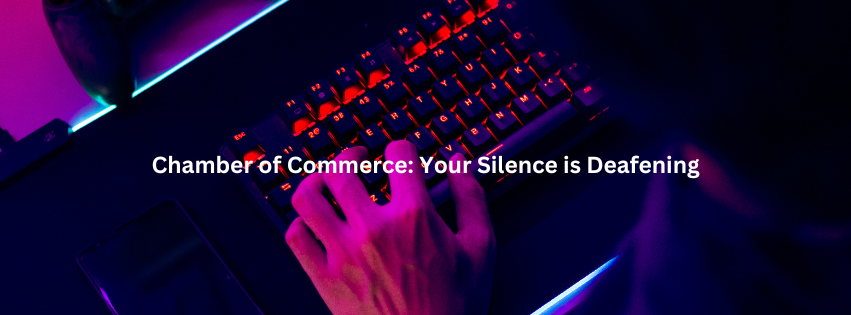The Deafening Silence: Chamber of Commerce’s Non-Response to Legal Concerns
Introduction
Public trust in institutions is foundational to a functioning democracy. When these institutions, especially those like the Chamber of Commerce (Chamber), fail to uphold transparency and legal standards, it not only erodes public confidence but also threatens the rule of law. Last week, I published an article raising critical legal concerns about the Chamber’s new fee structures for online access to the Trade Registry and some of the other fees charged for products or services. Regrettably, the Chamber has not issued any statement, press release, or post addressing these concerns. This silence is both deafening and alarming, suggesting either a lack of preparedness or a deliberate attempt to ignore public scrutiny. This follow-up article calls on the Chamber to respond and address the pressing issues that have been highlighted.
The Silence of the Chamber
Since the publication of the initial article, the Chamber’s lack of response has been notable. This non-engagement, of an otherwise vocal and visible Chamber, is particularly troubling given the serious legal questions raised about their fee structures. The public deserves transparency and accountability from institutions that serve them.
Undermining Public Trust:
The Chamber’s silence further undermines the public trust that is crucial for the legitimacy of any public institution. The absence of a response suggests either a disregard for public concern or an inability to justify their actions within a legal framework.
Legal Preparedness:
The implementation of the new fee structures and review of other fees should have been backed by thorough legal research and due diligence. The lack of an immediate response raises questions about whether the Chamber is now scrambling to seek legal advice post-implementation.
Political Tactics:
The silence may reflect a tactic commonly seen in political spheres, where issues are left unaddressed in the hope that public attention will eventually wane. This approach is unbecoming of a public institution that is supposed to operate transparently and ethically.
Revisiting the Concerns
To recap, the primary issues raised in the initial article involved the legality of the Chamber’s fee structures:
- Fee for Online Access: There is a significant question about whether the Chamber has the legal authority to impose these fees.The Chamber introduced a fee of AFL 1,200 per year or AFL 300 per quarter for online access to the Trade Registry.
- Higher Fees for English Extracts: The Chamber charges higher fees for extracts in English, which legally should not exceed Afl. 15, regardless of the language. This discrepancy suggests a potential violation of the legal framework governing the Chamber.
- Legal Framework and Compliance: Articles from the Handelsregisterbesluit (Trade Register Decree) and the LV Chamber (Commercial Register Ordinance) stipulate that fees must be regulated by specific governmental decrees (lbham). The lack of such decrees indicates that the current fee structures may not be legally justified.
Implications of Silence
- Financial and Legal Risks: Continued silence could lead to increased public dissatisfaction and potential legal actions from affected parties. The financial implications include refund claims for unjust fees collected without a legal basis.
- Erosion of Trust:The longer the Chamber remains silent, the more it erodes the trust and confidence of the public and the business community. Transparency and accountability are key to maintaining a positive relationship with the stakeholders.
A Call to Action
It is imperative that the Chamber breaks its silence and addresses the concerns raised. Here are the steps they should consider:
- Come out:The Chamber should immediately publish a post or release a public statement addressing the concerns about the fee structures. The Chamber needs to clarify whether these fees have a legal basis and provide evidence to support their position. Who knows perhaps I erred in my conclusions?
- The Board of Directors: The President of the Board of Directors and the other members of the Board need to take a stand and show that they either stand by these potential unlawful acts or if they will stand up and correct any wrongdoing. This would likely show the character that we can expect from them in their business dealings in their own businesses or the companies they work for. This perhaps can trigger some sensitivity but is also an issue we can not ignore. Integrity is a word often used, but the proof of the pudding is in the taste.
- Engage in Dialogue:The Chamber should engage in a dialogue with legal experts, stakeholders, and the public to discuss the issues and find a resolution. This engagement should be transparent and aimed at restoring public trust.
- Review and Rectify: The Chamber should review their fee structures and ensure they comply with the legal framework. If any fees are found to be unjust, they should take immediate steps to rectify this, including refunding unjust fees.
- Long-Term Measures: The Chamber should implement long-term measures such as regular legal audits and staff training to prevent future issues.Engaging with stakeholders to ensure practices align with public expectations and legal standards is crucial.
Conclusion
The Chamber of Commerce’s silence in response to serious legal concerns about their fee structures is both deafening and unacceptable. Public institutions must operate with transparency and accountability, especially when their actions directly impact the public and businesses they serve. The Chamber must address these issues promptly to restore public trust and demonstrate their commitment to legal and ethical governance. By taking the necessary steps to clarify, rectify, and engage, the Chamber can turn this situation around and set a positive example for other public institutions. The public deserves answers, and it is the Chamber’s responsibility to provide them.















